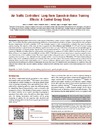Please use this identifier to cite or link to this item:
https://accedacris.ulpgc.es/jspui/handle/10553/21067
| Title: | Air traffic controllers' long-term speech-in-noise training effects: A control group study | Authors: | Pérez Zaballos, M.T. Pérez Plasencia, Daniel Zaballos González, María Luisa Ramos de Miguel, Ángel Ramos Macías, Ángel |
UNESCO Clasification: | 32 Ciencias médicas 2201 Acústica 220105 Ruido 330702 Electroacústica |
Keywords: | Air traffic controllers Auditory training Psychoacoustics Speech perception in noise |
Issue Date: | 2016 | Publisher: | 1463-1741 | Journal: | Noise and Health | Abstract: | Introduction:Speech perception in noise relies on the capacity of the auditory system to process complex sounds using sensory and cognitiveskills. The possibility that these can be trained during adulthood is of special interest in auditory disorders, where speech in noise perceptionbecomes compromised. Air traffic controllers (ATC) are constantly exposed to radio communication, a situation that seems to produceauditory learning. The objective of this study has been to quantify this effect.Subjects and Methods:19 ATC and 19 normal hearingindividuals underwent a speech in noise test with three signal to noise ratios: 5, 0 and−5 dB. Noise and speech were presented through twodifferent loudspeakers in azimuth position. Speech tokes were presented at 65 dB SPL, while white noise files were at 60, 65 and 70 dBrespectively.Results:Air traffic controllers outperform the control group in all conditions [P<0.05 in ANOVA and Mann-Whitney U tests].Group differences were largest in the most difficult condition, SNR=−5 dB. However, no correlation between experience and performancewere found for any of the conditions tested. The reason might be that ceiling performance is achieved much faster than the minimumexperience time recorded, 5 years, although intrinsic cognitive abilities cannot be disregarded.Discussion:ATC demonstrated enhancedability to hear speech in challenging listening environments. This study provides evidence that long-term auditory training is indeed useful inachieving better speech-in-noise understanding even in adverse conditions, although good cognitive qualities are likely to be a basicrequirement for this training to be effective.Conclusion:Our results show that ATC outperform the control group in all conditions. Thus, thisstudy provides evidence that long-term auditory training is indeed useful in achieving better speech-in-noise understanding even in adverseconditions. | URI: | https://accedacris.ulpgc.es/handle/10553/21067 | ISSN: | 1463-1741 | DOI: | 10.4103/1463-1741.195804 | Source: | Noise and Health [ISSN 1463-1741], vol.18 (85), p.376-381 | Rights: | by-nc-nd |
| Appears in Collections: | Artículos |
SCOPUSTM
Citations
4
checked on Jun 8, 2025
WEB OF SCIENCETM
Citations
3
checked on Jan 25, 2026
Page view(s)
80
checked on Jul 27, 2024
Download(s)
37
checked on Jul 27, 2024
Google ScholarTM
Check
Altmetric
Share
Export metadata
Items in accedaCRIS are protected by copyright, with all rights reserved, unless otherwise indicated.
